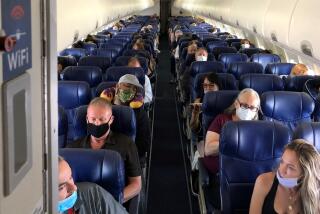Study May Bring Smoking Ban on Planes
- Share via
WASHINGTON — In a move expected to boost efforts to ban smoking on commercial airline flights, Surgeon General C. Everett Koop said Wednesday that he is sponsoring a clinical study to measure the effects of “passive” cabin smoke on flight attendants.
One airline, which he did not identify, has agreed to cooperate in testing for levels of cotinine--the metabolized end product of nicotine--in the urine and saliva of nonsmoking flight attendants, Koop said.
Passive Smoke
“It’s my suspicion that a young lady who works in the smoking end of a plane in the galley is probably ‘smoking’ three or four cigarettes a flight . . . just by inhaling the passive smoke,” he said at a breakfast session with The Times’ Washington Bureau. “That’s based upon what we know about cotinine in office space and in apartments,” he said, adding that “most homes and most offices aren’t built in the tubular construction of an airplane.”
The study, expected to be completed by June, will collect urine and saliva samples from flight attendants who work in the “highly concentrated” areas of smoke in the rear of the aircraft before “they fly on four-hour flights, when they finish the flight, eight hours later and 24 hours later,” Koop said.
“If you look back on a long flight--after dinner, especially--there is a tremendous cloud of smoke in the back, and it also is coming up to all the nonsmokers, “ he said.
The National Academy of Sciences and the American Medical Assn. have called for a ban on smoking on airline flights, and Sen. Orrin G. Hatch (R-Utah), former chairman of the Senate Labor and Human Resources Committee, has introduced legislation that would ban smoking on all public transportation.
Benchmark Report
Such a ban could be legislated by Congress or through a regulation initiated by the Transportation Department.
Koop, who has become a leading national spokesman on the dangers of tobacco during his two terms as surgeon general, said he believes his report on the risks of environmental smoke on nonsmokers, released last month, will become “as much a benchmark report as Luther Terry’s was in 1964.” The report by Terry, then surgeon general, considered a landmark document, first disclosed the relationship between lung cancer and cigarettes.
“We now have evidence that is pretty solid,” Koop said. “In fact, the evidence is more solid in this report than it was for Luther Terry’s report. Now, instead of people saying: ‘You know, smoking annoys me, it irritates me, my sinuses ache at night and my eyes burn and my clothes smell,’ they can also say: ‘We now have solid evidence that this is dangerous to my health.’ ”
Discussing his recent report to the public on AIDS, Koop said the epidemic of the deadly disease has changed his position on early sex education, which he had previously opposed.
“I like to call it--instead of sex education--I like to call it AIDS education,” he said. “We are facing a tremendous scourge. There’s never been a greater challenge to any society than AIDS presents. Therefore, when you have a big problem, you have to use big weapons. I have always been opposed to any type of sex education which taught technique without responsibility or morality.”
Lethal Disease
Further, he said: “We have not . . . something that’s a nuisance, not something that can be treated with penicillin, but something that is lethal--and it can be lethal in one single exposure, either through a homosexual experience or a heterosexual experience, or the use of (intravenous) drugs, sharing equipment with somebody who is already infected.
“I think we’ve got to get that message across to young people because they tend to think they’re immortal anyway,” he continued. “And you cannot teach anybody about AIDS unless you teach them something first about sex.”
More to Read
Sign up for Essential California
The most important California stories and recommendations in your inbox every morning.
You may occasionally receive promotional content from the Los Angeles Times.










